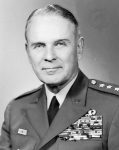 Maxwell Taylor (1901-1987) was a US Army general who played an important role in the Cold War and Vietnam during the 1960s. Taylor was born in Missouri, graduated from high school and passed entrance exams to the United States Military Academy at West Point. He served as an engineering and artillery officer before retraining in linguistics. An intelligent and well-spoken leader, Taylor obtained rapid promotions during World War II, rising from major to brigadier general in less than three years. He spent most of the war in the US but also served in Italy and during the D-Day landings. After World War II Taylor served as superintendent at West Point, Allied commander in West Berlin and commander of the Eighth Army in the Korean War. Taylor was appointed US Army Chief of Staff in 1955. During Taylor’s tenure, he held different views to president Dwight Eisenhower. While Eisenhower sought to maintain America’s nuclear deterrent, Taylor preferred to expand conventional forces. These differences of opinion contributed to Taylor’s decision to retire in 1959.
Maxwell Taylor (1901-1987) was a US Army general who played an important role in the Cold War and Vietnam during the 1960s. Taylor was born in Missouri, graduated from high school and passed entrance exams to the United States Military Academy at West Point. He served as an engineering and artillery officer before retraining in linguistics. An intelligent and well-spoken leader, Taylor obtained rapid promotions during World War II, rising from major to brigadier general in less than three years. He spent most of the war in the US but also served in Italy and during the D-Day landings. After World War II Taylor served as superintendent at West Point, Allied commander in West Berlin and commander of the Eighth Army in the Korean War. Taylor was appointed US Army Chief of Staff in 1955. During Taylor’s tenure, he held different views to president Dwight Eisenhower. While Eisenhower sought to maintain America’s nuclear deterrent, Taylor preferred to expand conventional forces. These differences of opinion contributed to Taylor’s decision to retire in 1959.
In 1960 Taylor published The Uncertain Trumpet, outlining what he believed was the best US military strategy for the Cold War. Incoming US president John F. Kennedy was impressed by Taylor’s ideas and recalled him to active service as an advisor. In October 1961 Kennedy sent Taylor to South Vietnam to investigate and appraise the situation there. Taylor returned to Washington and urged the deployment of an 8,000-strong US combat force, a proposal Kennedy ignored. Like others before and after him, Taylor overestimated the capacity of South Vietnamese leader Ngo Dinh Diem, while underestimating the strength of the Viet Cong. Taylor was appointed Chairman of the Joint Chiefs in 1962. He made three more visits to Vietnam, each with defence secretary Robert McNamara. In July 1964 Taylor retired from the military a second time and was named US ambassador to South Vietnam, replacing Henry Cabot Lodge. It was a strange appointment, given Taylor’s lack of diplomatic experience and his limited understanding of South Vietnamese politics. During his time as ambassador Taylor advised president Lyndon Johnson to take stronger action to force North Vietnam to the peace table.
Taylor resigned as ambassador in July 1965. He continued to serve on intelligence boards and provide advice to the Johnson administration, though he no longer supported the deployment of US combat troops in Vietnam. Taylor retired from public service in 1970 and died in Washington in April 1987.
Content on this page is © Alpha History 2018-23. This content may not be republished or distributed without permission. For more information please refer to our Terms of Use.
This page was written by Jennifer Llewellyn and Steve Thompson. To reference this page, use the following citation:
J. Llewellyn & S. Thompson, “Maxwell Taylor”, Alpha History, accessed [today’s date], https://alphahistory.com/coldwar/maxwell-taylor/.
